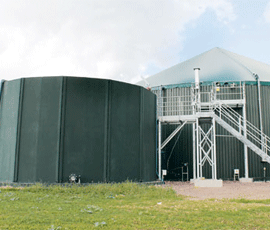Funding scheme aims to boost biogas uptake

Plans to develop a network of more than 40 biogas plants around the UK over the next five years, many of which could be on farms, have been unveiled.
A new company, Tamar Energy, has made a total of £65m funding available for the plants, which will run primarily on organic waste. It has been backed by a number of investors, including Sainsbury’s, RIT Capital and the Duchy of Cornwall.
“The underdevelopment of anaerobic digestion in the UK is principally driven by a historic lack of financing for the sector,” Alan Lovell, chairman of Tamar Energy said. “We will be well capitalised by investors, with a pure focus on producing energy from organic waste, rather than as an adjunct to a waste management business.”
It is hoped that collectively, 100MW of green electricity will be produced by the plants, the first of which is due to be built at Winston Reed’s 800-cow dairy farm near Tiverton in Devon this autumn.
Mr Reed, who is also a director of food and energy specialist Greener for Life, said the 3MW Tiverton Energy Centre plant would run on a combination of food waste, cow slurry accumulated during winter housing, plus grass and maize silage.
“It is a privilege to be working with Tamar Energy who have the vision to make anaerobic digestion accessible, affordable and part of the solution to the country’s future energy needs,” he said.
GfL will also be involved with assessing every proposed plant to ensure they meet required sustainability criteria.
Funding will be targeted at farmers with suitable sites and the ability to take food waste. This means good transport links, enough land to spread digestate, ability to buffer the plant with cow/pig manures, or grass/maize silage and an ability to help with management of the plant.
Farm AD sites taking in food waste would need to be separated from livestock areas due to animal by-product regulations, Mr Reed noted. In such cases, slurries could be pumped underground to the AD site.
Tamar Energy said plants would be matched to local waste and energy needs to minimise transport impacts. Projects would be developed in partnership with local farming groups, it said.
Sainsbury’s said that as part of the deal, it would work with its suppliers to ensure they had access to Tamar’s new AD plants, which would reduce waste in the supply chain.
Tamar’s plans were strengthened by the acquisition of AD specialists Adgen Energy, which had an “advanced pipeline” of projects and a strong management team.

